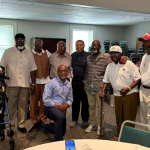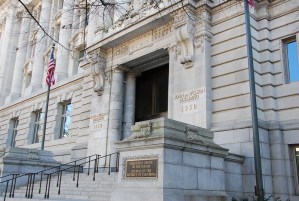By Ryan Michaels
The Birmingham Times
Once sentenced to die in prison, Joe Bennett walked out of William E. Donaldson Correctional in 2021, after a Jefferson County judge granted a motion for post-conviction relief and resentencing.
Two years since his release, which was initiated by a legal motion from Alabama Appleseed, Bennett now has his own business, Beauty 4 Wholeness, which handles tree maintenance with partner business Greenbriar Tree Service.
On Thursday, he shared his success story during a luncheon hosted by Appleseed at Canterbury United Methodist Church in Mountain Brook and shared how he had to make decisions that would help lead to his freedom.
“The culture in prison, as such, is drugs, prison whiskey. Everything that really landed me in prison was drugs, marijuana, crack cocaine and the addiction that I had, and I found out once I got in there, everything that led me there was in there… ‘When you hit rock bottom, you have to look up,’” Bennett said.
Bennett said he quickly got into a structured, faith-based dormitory while incarcerated and lived, “by the grace of God, like I wanted to get out.”
He did, with the help of Appleseed, which advocates on behalf of incarcerated people across the U.S. with policy change campaigns, research and litigation, among other work. Bennett told his story with Ramzee Robinson, an Appleseed board member, as the guest speaker.
Growing up in the Northwood and Lincoln Park public housing developments in Huntsville, Robinson said the criminal justice system was a regular part of life.
Before he graduated from S.R. Butler High School, his brother had been put in jail for more than 15 years. Robinson went on to play cornerback for the Alabama Crimson Tide football team, before playing for three NFL teams and a Canadian Football League team.
Today, Robinson works as director of player engagement for the Super Bowl champion Kansas City Chiefs, as well as a mental health counselor for foster children. Robinson’s success, he said, is owed in large part to the support he received from others.
“My decisions weren’t always right…but there was somebody there that when it wasn’t, they supported me through it—showed me some grace,” Robinson said.
Alabama Appleseed is a way to continue that work, said Robinson at Canterbury United Methodist Church.
“That’s what we’re doing in here,” he told guests including about a half-dozen formerly incarcerated individuals whom Appleseed helped get released from prison and start new lives. “We’re giving grace, non-judgment, operating out of love, for a common cause.”
In addition to Robinson’s work with Appleseed, the NFL has also provided grant funding for the organization since 2020.
Robinson joined organization’s board of directors in 2021, the same year that his cousin Terry Sean died of an apparent homicide in a Tennessee prison.
Growing up, Robinson said he had to make a choice about how to live his life, “either pick up a gun to go out and try to make ends meet, to try to convince others that they should respect me or pick up the football.”
Robinson said when he made his decision, he was ultimately seeking the same thing as any other child, “validation,” but that he was fortunate it wasn’t the gun.
“Just by the grace of God, I chose to pick up the football and utilize that as my resource, or that as the medium to obtain access to resources, like I stand here today as a Super Bowl champion, being on staff with the Chiefs, but I could’ve easily been somewhere else based upon that choice,” Robinson said.
Alabama Appleseed is the state chapter of a national nonprofit which seeks to advocate on behalf of incarcerated people across the U.S. with policy change campaigns, research and litigation, among other work.
For more on Alabama Appleseed, visit https://alabamaappleseed.org











